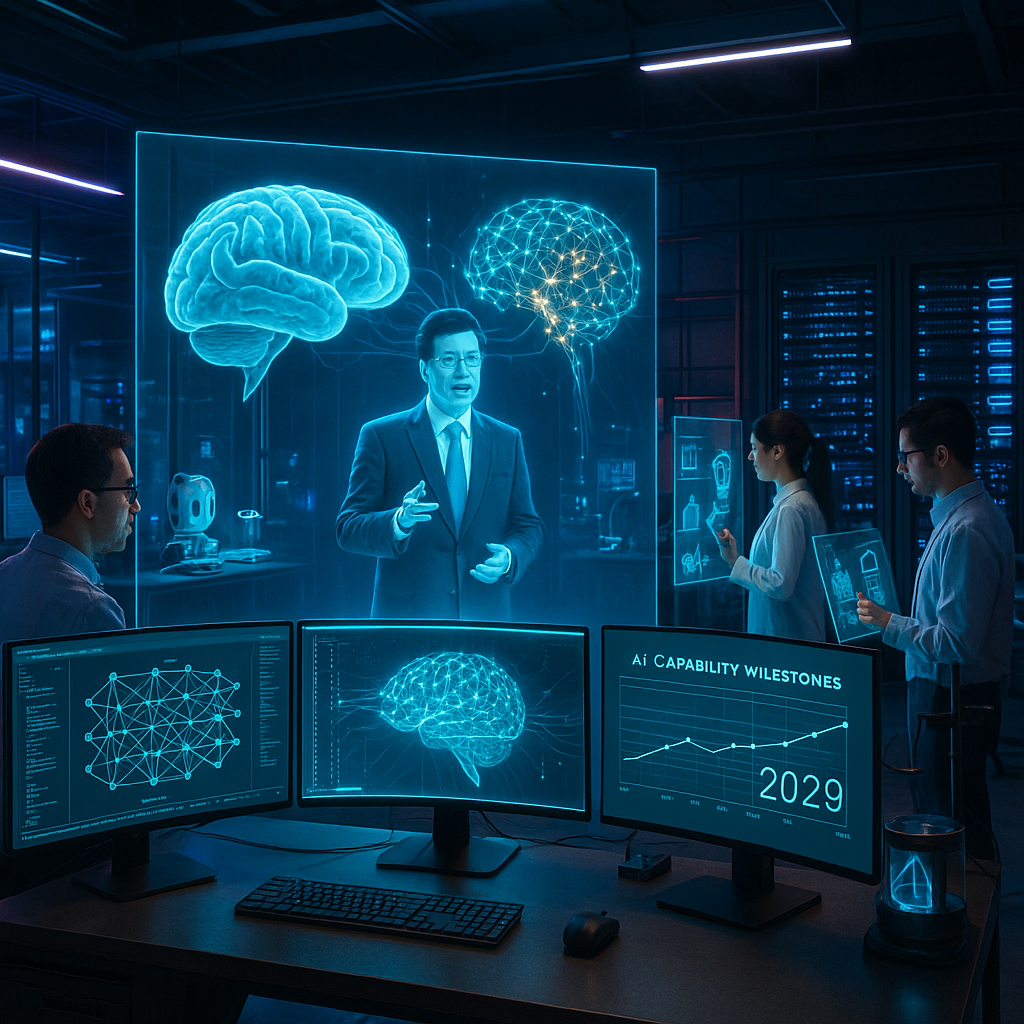Key Takeaways
- Kai-Fu Lee forecasts near-term AI superiority: Lee predicts that artificial intelligence will match or surpass most human intellectual skills within five years, shifting expectations for AI progress.
- Raises profound questions about consciousness: Lee introduces AI as a fundamentally different form of intelligence, challenging traditional definitions of mind and consciousness.
- Technological acceleration outpaces human adaptation: According to Lee, the rapid advancement of AI risks outstripping the ability of societal, ethical, and educational systems to keep pace.
- Call for philosophical and ethical engagement: Lee urges consideration of AI’s cultural and ethical impact, advocating for reflection beyond the scope of engineering disciplines.
- Wider conversation emerging: Lee’s viewpoint signals a move from reporting incremental AI progress to engaging in wider existential discussions, as experts and the public contemplate coexistence with non-human minds.
Introduction
AI pioneer Kai-Fu Lee sparked debate at a recent conference by asserting that artificial intelligence could exceed most human cognitive abilities within five years. This prediction reframes the discussion from technical achievements to fundamental questions about what it means to coexist with minds unlike our own. As AI development outpaces society’s readiness, Lee challenges technologists, philosophers, and the broader public to deeply examine concepts of consciousness, ethics, and changing boundaries of intelligence.
Kai-Fu Lee’s Bold Prediction
Kai-Fu Lee, former president of Google China and noted AI investor, predicts that artificial intelligence will overtake most human cognitive abilities by 2029. Addressing the World Economic Forum’s AI Governance Summit, Lee attributed this outlook to the swift acceleration of AI capabilities—especially in language comprehension and problem-solving.
This forecast shortens prior estimates, which generally anticipated such developments in the 2040s or beyond. Advances in large language models and multimodal AI systems were cited as key evidence for this revised timeline.
He stated that AI capabilities are growing exponentially, driven by increased computational power, improved algorithms, and richer data resources.
Stay Sharp. Stay Ahead.
Join our Telegram Channel for exclusive content, real insights,
engage with us and other members and get access to
insider updates, early news and top insights.
 Join the Channel
Join the Channel
The Technical Foundation
Recent progress in AI supports Lee’s ambitious timeline. GPT-4 and its successors have exhibited advanced abilities in language comprehension, reasoning, and creative tasks.
Multimodal AI systems are now capable of integrating text, images, and audio to approach human-like understanding of complex scenarios. These systems generate coherent output across domains ranging from medical interpretation to legal analysis.
Enhanced computational efficiency has reduced resource demands for high-level AI operations, making sophisticated technologies more accessible and accelerating innovation further.
Challenging Traditional Timelines
Lee’s prediction differs sharply from more cautious projections by other industry experts. Organizations such as DeepMind and OpenAI have historically anticipated a longer timeline for achieving human-level artificial intelligence.
Stuart Russell, professor of computer science at UC Berkeley, voiced skepticism regarding the five-year estimate. He argued that while AI’s progress is significant, achieving human flexibility and general reasoning remains a substantial challenge.
This debate raises critical questions about how to measure and define human-equivalent cognitive abilities.
Professional Impact Assessment
The rapid progress of AI stands to affect professional work across many fields. Knowledge workers in law, medicine, and finance may confront disruption earlier than expected.
Stanford University professor Erik Brynjolfsson emphasized the need to urgently rethink approaches to education and professional development in response to this forecast.
Organizations are already feeling pressure to adopt AI systems, with some observing productivity improvements that lend credence to Lee’s timeline.
Societal Implications
Lee’s prediction prompts new concerns about society’s adaptation to fast-moving technological changes. Compressed timelines challenge the effectiveness of traditional policy-making and regulatory approaches.
Ethical considerations take on increased urgency, particularly around AI’s influence on employment, privacy, and individual agency. The World Economic Forum has urged the acceleration of governance frameworks in light of these shifts.
Social scientists caution that rapid advancement could worsen existing inequalities if not addressed thoughtfully. Diana Farrell, former chief executive of JPMorgan Chase Institute, highlighted the need for equitable distribution of AI’s benefits.
Research Community Response
The research community has met Lee’s prediction with enthusiasm and apprehension. Scholars underscore the necessity of intensifying work on AI safety and alignment as timelines shorten.
Leading AI labs are hastening the development of safety protocols and ethical guidelines. Yoshua Bengio, founder of Mila, stressed the urgency of prioritizing safety research if Lee’s predictions prove correct.
Technical obstacles remain, particularly in achieving broad contextual and common-sense reasoning. Nonetheless, the pace of recent developments suggests these hurdles could be cleared sooner than previously believed.
Conclusion
Kai-Fu Lee’s accelerated timeline compels a deeper examination of how societies, professions, and regulatory structures adapt to sweeping technological change. The spotlight is shifting from incremental progress to urgent debates about safety, equity, and governance. What to watch: evolving dialogue and policy initiatives at leading AI forums, along with milestone developments in safety research over the coming year.
Stay Sharp. Stay Ahead.
Join our Telegram Channel for exclusive content, real insights,
engage with us and other members and get access to
insider updates, early news and top insights.
 Join the Channel
Join the Channel
fundamental questions about what it means
consciousness, ethics, and changing boundaries of intelligence





Leave a Reply